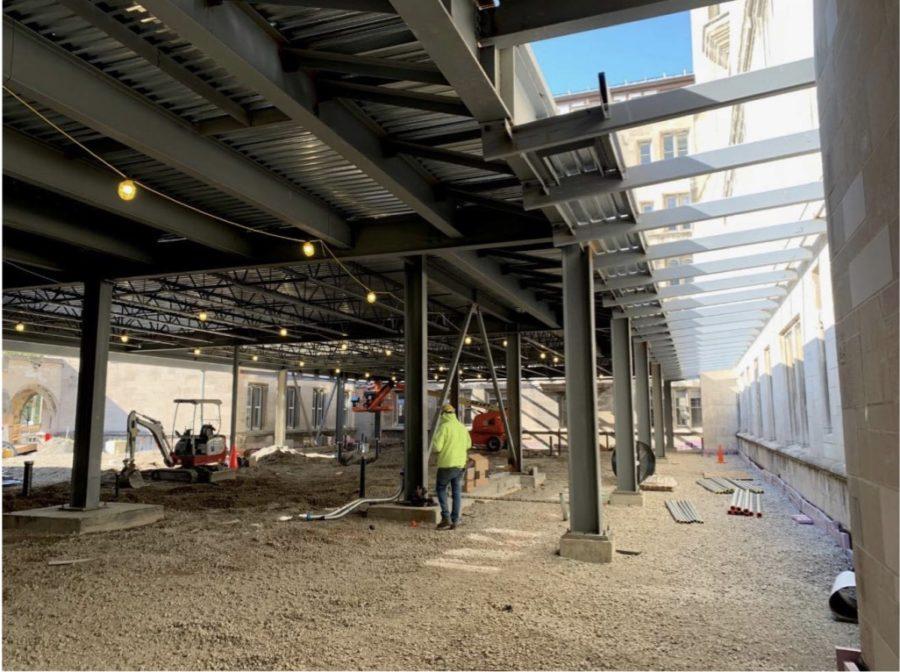Construction of the University’s new Health and Wellness Center is well underway and on track to open Autumn quarter of next year. The new center will add space and centralize services, which administrators argue could improve logistics and alleviate long wait times by making scheduling more efficient.
The move to the new space is not tied to any hiring initiative. Currently, the University is hiring at least one additional psychologist, who will work as an administrator and part-time clinician, according to the position's job description. University spokesman Gerald McSwiggan said, “We have increased the number of Student Health and Counseling Services staff in recent years and the Wellness Center will enable us to continue this trend.”
The Wellness Center will move Student Health Service, Student Counseling Service, and Health Promotion and Wellness into one new location constructed inside a currently unused courtyard and will adjoin the current part of the hospital which houses the Student Health offices.
In the past few years, SHCS has added new employees to serve the growing number of students enrolled in the College, and current office spaces are not large enough to house all SHCS employees. Recently, in Student Counseling’s Alumni House space, walls were erected to divide office spaces in two to add more private offices.
Despite staffing increases, Student Counseling Service (SCS) continues to struggle to accommodate the number of students in need of SCS. The high demand for SCS has limited the accessibility of some mental health services on campus, and long wait times for intake appointments have been a recurring student grievance.
Second-year Valentine Figuera said his experience with counselors at SCS was positive and they provided an environment where he could comfortably and openly discuss difficult situations, but getting an initial appointment was not a timely process. “In terms of improvement, I think the most obvious is that the services are understaffed, and I had my appointment a week and a half after I scheduled it,” Figuera said. “It did become a long ten days until I had my meeting.”
Some students have decided to use emergency walk-in counseling rather than wait for an intake appointment. Fourth-year Silvia Diaz took this option after learning she would have to wait two weeks to have an initial intake appointment. Diaz sees long wait times as a lost opportunity for SCS to help students who may need more immediate help but do not feel comfortable going to the emergency walk-in counseling.
“I decided to go in through the emergency walk-in, which I’m in a position in my life where I’ll take up that space and feel comfortable going there, but it’s not really something that I feel everyone would be open to taking,” Diaz said.
With all services in one location, SHCS hopes to revamp their scheduling by eliminating the need for cross-building communication, which can slow down the process of getting students into appointments. The centralized building will also remove any confusion about where students must go to receive care.
In making design decisions for the Wellness Center, SHCS consulted students through town halls, online surveys, and conversations with the Student Health Advisory Board. Following these consultations, the design for the renovation was to improve students’ experiences upon entering the Center as well as to prioritize confidentiality from the moment students walk into the Wellness Center.
According to the University, the Wellness Center was designed with interconnected halls and offices that are not organized in an immediately distinguishable pattern, such that the reason for a student’s visit—for example, receiving a crisis consultation or individual counseling—is not identifiable by the direction they walk through the building.
With all health services located under one roof, students can be directed to all services from a single check-in location. The University also intends for the Wellness Center to offer workspaces for students and act as a meeting place for wellness activities.
While centralization of services and scheduling optimization is one solution to reducing intake appointment times, student groups have advocated for different solutions. Notably, the University of Chicago’s chapter of Active Minds, an organization supporting mental health awareness and education, has suggested shifting SCS hours to deal with long waits.
Active Minds copresident Daily Desenberg said SCS’s “hours of operation coincide with the time that most students are in class, which is a large part of the reason the wait times for intake appointments are so long.” She suggested that “adjusting their weekday hours and having appointments on weekends would make a huge difference.”
Among students, SCS has also been criticized for a high referral rate to outside clinicians. Diaz said, “As I understand it, all counseling services are provided on a short-term basis, and after a certain number of sessions it’s encouraged that students seek outside therapists or counselors…which is fine and all, but when I was going through the process myself of finding an outside therapist, I found it really difficult to find one that had openings.”
SHCS says that referrals are made on a case-by-case basis and there is no limit to the number of counseling sessions a student may attend through SCS. Students are directed to outside counselors and therapists at the SHCS counselor’s discretion, based on whether the best care for the student is beyond what SHCS can provide.
Throughout SHCS, there is a focus on increasing preventative protective factors: programming and initiatives that seek to offer resources for students to better their health before reaching a crisis situation. SHCS hopes wellness services may allow students to practice good mental health and act as resources for students that reduce the need for long-term counseling.










